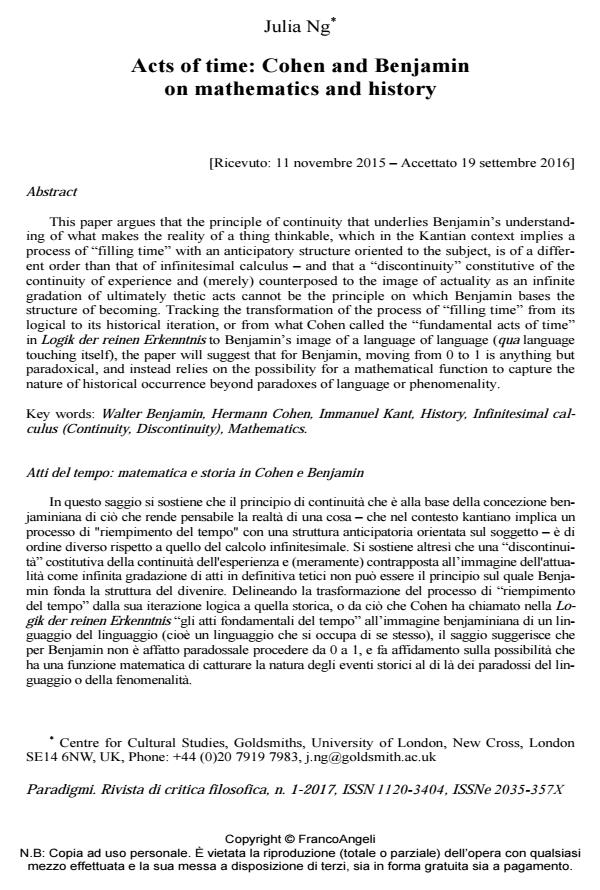Acts of time: Cohen and Benjamin on mathematics and history
Journal title PARADIGMI
Author/s Julia Ng
Publishing Year 2017 Issue 2017/1 Language English
Pages 20 P. 41-60 File size 411 KB
DOI 10.3280/PARA2017-001004
DOI is like a bar code for intellectual property: to have more infomation
click here
Below, you can see the article first page
If you want to buy this article in PDF format, you can do it, following the instructions to buy download credits

FrancoAngeli is member of Publishers International Linking Association, Inc (PILA), a not-for-profit association which run the CrossRef service enabling links to and from online scholarly content.
This paper argues that the principle of continuity that underlies Benjamin’s understanding of what makes the reality of a thing thinkable, which in the Kantian context implies a process of "filling time" with an anticipatory structure oriented to the subject, is of a different order than that of infinitesimal calculus ? and that a "discontinuity" constitutive of the continuity of experience and (merely) counterposed to the image of actuality as an infinite gradation of ultimately thetic acts cannot be the principle on which Benjamin bases the structure of becoming. Tracking the transformation of the process of "filling time" from its logical to its historical iteration, or from what Cohen called the "fundamental acts of time" in Logik der reinen Erkenntnis to Benjamin’s image of a language of language (qua language touching itself), the paper will suggest that for Benjamin, moving from 0 to 1 is anything but paradoxical, and instead relies on the possibility for a mathematical function to capture the nature of historical occurrence beyond paradoxes of language or phenomenality.�
Keywords: Walter Benjamin, Hermann Cohen, Immanuel Kant, History, Infinitesimal calculus (Continuity, Discontinuity), Mathematics
- Agamben G. (1999). Tradition of the Immemorial. In: Potentialities: Collected Essays in Philosophy. Stanford: Stanford University Press: 107-108 (Engl. transl. by D. Heller-Roazen).
- Benjamin W. I Ms (1850) and II Ms (1857) (untitled) at the Walter Benjamin Archiv, Akademie der Künste, Berlin.
- Benjamin W. (1974-1989). Gesammelte Schriften, hrsg. von R. Tiedemann und H. Schweppenhäuser, 7 vols, Frankfurt a. M.: Suhrkamp.
- Bolzano, B. (1851). Bernard Bolzano's Paradoxien des Unendlichen, hrsg. von Fr. Prihonsky, Leipzig: C.H. Reclam.
- Cohen H. (1883). Das Prinzip der Infinitesimal-Methode und seine Geschichte: Ein Kapitel zur Grundlegung der Erkenntnisskritik. Berlin: Dümmler.
- Cohen, H. (1885). Kants Theorie der Erfahrung. 2nd revised ed. Berlin: Dümmler.
- Cohen H. (1914 [1902]). Logik der reinen Erkenntnis. System der Philosophie. Erster Teil. 2nd corrected ed. Berlin: Bruno Cassirer.
- Derrida J. (1991). Interpretations at War: Kant, the Jew, the German. New Literary History, 22, 1: 39-95.
- Fenves, P. (2011). The Messianic Reduction: Walter Benjamin and the Shape of Time. Stanford: Stanford University Press.
- Gasché R. (2009). Europe, or the Infinite Task: a Study of a Philosophical Concept. Stanford: Stanford University Press.
- Hausdorff F. (1914). Grundzüge der Mengenlehre. Leipzig: Veit.
- Heidegger M. (1988). The Basic Problems of Phenomenology. Bloomington: Indiana University Press: 53-54 (transl. by A. Hofstadter).
- Leibniz G. W. (1989 [1702]). Letter to Varignon, with a Note on the “Justification of the Infinitesimal Calculus by that of Ordinary Algebra”, February 2, 1702. In: Philosophical Papers and Letters, ed. by L.E. Loemker, 2nd ed, Dordrecht-Boston: London: Kluwer Academic Publishers: 544.
- Mongré P. [= Hausdorff F.] (1897). Sant’Ilario: Gedanken aus der Landschaft Zarathustras. Leipzig: Naumann.
- Mongré P. [= Hausdorff F.] (1898). Das Chaos in kosmischer Auslese: Ein erkenntniskritischer Versuch. Leipzig: Naumann.
- Ng J. (2012). Kant’s Theory of Experience at the End of the War: Scholem and Benjamin read Cohen. MLN, 127, 3: 462-484.
- Ronell A. (2005). The Test Drive. Urbana and Chicago: University of Illinois Press.
- Schoenflies A. (1911). Über die Stellung der Definition in der Axiomatik. Jahresbericht der Deutschen Mathematiker-Vereinigung, 20: 222-255.
- Schoenflies A. (1921). Zur Axiomatik der Mengenlehre. Mathematische Annalen, 83: 173-200.
- Scholem G. (1995-2000). Tagebücher nebst Aufsätzen und Entwürfen bis 1923, 2 vols. Frankfurt a. M.: Jüdischer Verlag.
- Scholem G. (2012). Über Kant and gegen die metaphysische Erörterung des Raumes (On Kant. Against the Metaphysical Exposition of Space). MLN, 127, 3: 440-461.
- Varignon P. (1690). Nouvelles conjectures sur la pesanteur. Paris: Jean Boudot.
Julia Ng, Acts of time: Cohen and Benjamin on mathematics and history in "PARADIGMI" 1/2017, pp 41-60, DOI: 10.3280/PARA2017-001004